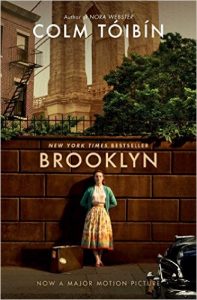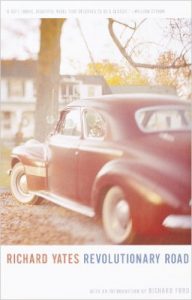6/10/2016. CAN A MOVIE BE AS GOOD AS THE BOOK?
6/10/2016. CAN A MOVIE BE AS GOOD AS THE BOOK?
I love movies almost as much as I love books. And, thanks to Netflix, I  watch as many of them as I can. Unfortunately, movies based on high-quality fiction rarely seem to achieve the richness of the original novels. Nevertheless, novels have become popular sources for movies. Of the eight movies nominated for the 2016 Best Picture Oscar, four were based on novels. Three of those offered stories that didn’t interest me, but I was eager to see Brooklyn. In my opinion, it was an all-right movie, but even though I haven’t read the novel, I kept thinking the novel surely offered so much more. The main character, Eilis Lacey, was appealing but not engaging. I wasn’t with her as closely as I wanted to be. I didn’t feel what she felt.
watch as many of them as I can. Unfortunately, movies based on high-quality fiction rarely seem to achieve the richness of the original novels. Nevertheless, novels have become popular sources for movies. Of the eight movies nominated for the 2016 Best Picture Oscar, four were based on novels. Three of those offered stories that didn’t interest me, but I was eager to see Brooklyn. In my opinion, it was an all-right movie, but even though I haven’t read the novel, I kept thinking the novel surely offered so much more. The main character, Eilis Lacey, was appealing but not engaging. I wasn’t with her as closely as I wanted to be. I didn’t feel what she felt.
In an article written for Slate.com a few years ago, Willing Davidson had similar thoughts about Revolutionary Road, which he says is “both the worst movie I saw this year and one of the best novels I’ve read.” The problem with the movie, he contends, lies in the viewers’ lack of involvement. With the novel, author Richard Yates’ language enables readers to experience April and Frank Wheeler’s dissolution of hope along with the characters, so that their despair becomes the readers’. In the movie, the emphasis is on plot, which relegates viewers to spectator status. “We’ll never know these people,” Davidson says. “They’re not us.”
Literary Agent Donald Maass offers more insight into the dilemma of movie adaptations with an explanation of the difference between literary and commercial fiction for Writer Unboxed. He isn’t actually talking about movies, but I think his points are relevant. Authors of commercial fiction, he explains, most often use scenes to tell their stories. Authors of literary fiction add what he calls postcards to those scenes, not to move the story forward but to take the story deeper. To illustrate his point, he compares The Nightingale and All the Light We Cannot See, two recent novels about World War II. Scenes in The Nightingale show change in the lives and attitudes of the characters. Postcards in All the Light We Cannot See bring about internal change, but not in the characters. The change is in the readers and their perception of the conditions of the characters. Davidson might say, “They become us.”
Both The Nightingale and All the Light We Cannot See have been optioned for film, by Tri-Star and 20th Century Fox, respectively. Having read and loved All the Light We Cannot See, I’ll be interested to see what kind of movie it becomes. So much of the strength and beauty of the novel lies in author Anthony Doerr’s postcards, which are filled with sophisticated, lyrical language. I feel the same way about Elena Ferrante’s Neapolitan novels, which are scheduled to become an international TV series. I don’t see how the depth of Ferrante’s writing can be conveyed on a flat screen.
 At the least, I hope the screen adaptations of the Neapolitan novels and All the Light We Cannot See are faithful to the story and spirit of the novels. In another review of the movie Revolutionary Road, the reviewer points out that for her a weakness of the film is that it focuses on the character of April, whereas the novel is told from Frank’s point of view. The shift in focus makes it difficult for the viewer to understand why April married Frank. In the novel, the attraction is clear.
At the least, I hope the screen adaptations of the Neapolitan novels and All the Light We Cannot See are faithful to the story and spirit of the novels. In another review of the movie Revolutionary Road, the reviewer points out that for her a weakness of the film is that it focuses on the character of April, whereas the novel is told from Frank’s point of view. The shift in focus makes it difficult for the viewer to understand why April married Frank. In the novel, the attraction is clear.
The worst movie adaptation I’ve ever seen is Admission, based on the excellent novel by Jean Hanff Korelitz. The novel is the very serious story of a woman who gives up her son for adoption when he is born and the sacrifices she makes for him when he comes back into her life as a young adult. It’s a thoughtful, provocative look at relationships and responsibility. The movie industry took that story and turned it into a comedy with a very different ending staring Tina Fey.
Admission’s fate proves what Ernest Hemingway said about novelists and movies: “Drive to the border of California, throw your book over the fence. When they throw the money back over the fence, collect the money and drive home.”
Does it really have to be that way? Some novels, no matter how big a bestseller they are, should not be made into movies. Movie makers need to realize the limits of their medium and stick to stories that can be told completely and well on the screen. And that doesn’t mean they all have to be action/adventure stories. Some insightful novels can be made into good movies.
Remember To Kill a Mockingbird, anyone?
Sally Whitney
Sally Whitney is the author of When Enemies Offend Thee and Surface and Shadow, available now from Pen-L Publishing, Amazon.com, and Barnesandnoble.com. When Enemies Offend Thee follows a sexual-assault victim who vows to get even on her own when her lack of evidence prevents police from charging the man who attacked her. Surface and Shadow is the story of a woman who risks her marriage and her husband’s career to find out what really happened in a wealthy man’s suspicious death.
Sally’s short stories have appeared in magazines and anthologies, including Best Short Stories from The Saturday Evening Post Great American Fiction Contest 2017, Main Street Rag, Kansas City Voices, Uncertain Promise, Voices from the Porch, New Lines from the Old Line State: An Anthology of Maryland Writers and Grow Old Along With Me—The Best Is Yet to Be, among others. The audio version of Grow Old Along With Me was a Grammy Award finalist in the Spoken Word or Nonmusical Album category. Sally’s stories have also been recognized as a finalist in The Ledge Fiction Competition and semi-finalists in the Syndicated Fiction Project and the Salem College National Literary Awards competition.
- Web |
- More Posts(67)